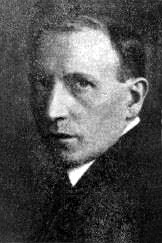|
Imre Földes (writer)
Imre Földes, born Imre Fleischmann, also known as Emmerich Feld (15 September 1881, Kaposvár - 30 April 1958, Budapest) was a Hungarian playwright and librettist. Biography Földes originally worked as a government official in Budapest. In his spare time, he wrote historical plays in verse. His first work to receive a performance, in 1904, was ''A Király Arája'' (The King's Bride), which was presented at the National Theatre. A long series of Romantic dramas followed; three of which won awards from the Hungarian Academy of Sciences. Much of his audience appeal was derived from his handling of social topics. In ''A Császár Katonái'' (The Emperor's Soldiers, 1908), he depicted the anti-Hungarian attitudes that were widespread in the Austro-Hungarian Army. In ''Hivatalnok Urak'' (The Clerks, 1909), he portrays the lives of government officials who behave like the public's masters, while unable to solve their own daily problems. Critics described his plays as "more or ... [...More Info...] [...Related Items...] OR: [Wikipedia] [Google] [Baidu] |
Imre Földes
Imre Földes (5 May 1881, Budapest - 1948?, Budapest) was a Hungarian graphic artist, painter, book designer, poster artist and engraver. Biography In 1897, at the age of sixteen, he began his studies at the commercial drawing school (''Kereskedelmi Szakközépiskola'') in Budapest. A year later, he transferred to the Royal Drawing School, where he studied with and Tivadar Zemplényi. He completed his studies in Berlin and Vienna. His interest in advertising and poster art manifested itself from the very beginning and he established himself as a commercial artist. In 1910, he exhibited his poster designs at the Hall of Art. The critical response was positive. That same year, and again in 1917, he participated in competitions for postage stamp designs; depicting Saint Stephen and Emperor Charles I with his wife, Empress Zita. Several of his designs were used on stamps issued in 1918. Shortly after, he founded a lithography workshop, where he created movie posters in col ... [...More Info...] [...Related Items...] OR: [Wikipedia] [Google] [Baidu] |
Viktoria Und Ihr Husar
''Viktoria und ihr Husar'' (''Victoria and Her Hussar'' is an operetta in three acts and a prelude by Paul Abraham with a libretto by Alfred Grünwald and Fritz Löhner-Beda, based on a work by the Hungarian playwright Imre Földes. It premiered under the baton of the composer on 21 February 1930 in Budapest. The German premiere was on 7 July 1930 in Leipzig, and it was then given on 23 December 1930 at the Theater an der Wien, Vienna. An adaptation into English by Harry Graham was performed at the Palace Theatre, London, on 17 September 1931. (Leipzig and London premieres; also: detailed plot, cast of the London premiere, musical numbers Roles Synopsis Time and place The operetta takes place after the end of the first world war in a Russian prison camp in Siberia, as well as in the cities Tokyo (Japan), St. Petersburg (Russia) and the Hungarian village Dorozsma near Szeged. Prelude Stefan Koltay, Cavalry Master of the Husars, and his batman Jancsi have become prisoner ... [...More Info...] [...Related Items...] OR: [Wikipedia] [Google] [Baidu] |
People From Kaposvár
The term "the people" refers to the public or common mass of people of a polity. As such it is a concept of human rights law, international law as well as constitutional law, particularly used for claims of popular sovereignty. In contrast, a people is any plurality of persons considered as a whole. Used in politics and law, the term "a people" refers to the collective or community of an ethnic group or nation. Concepts Legal Chapter One, Article One of the Charter of the United Nations states that "peoples" have the right to self-determination. Though the mere status as peoples and the right to self-determination, as for example in the case of Indigenous peoples (''peoples'', as in all groups of indigenous people, not merely all indigenous persons as in ''indigenous people''), does not automatically provide for independent sovereignty and therefore secession. Indeed, judge Ivor Jennings identified the inherent problems in the right of "peoples" to self-determination, as i ... [...More Info...] [...Related Items...] OR: [Wikipedia] [Google] [Baidu] |
Hungarian Librettists
Hungarian may refer to: * Hungary, a country in Central Europe * Kingdom of Hungary, state of Hungary, existing between 1000 and 1946 * Hungarians/Magyars, ethnic groups in Hungary * Hungarian algorithm, a polynomial time algorithm for solving the assignment problem * Hungarian language, a Uralic language spoken in Hungary and all neighbouring countries * Hungarian notation, a naming convention in computer programming * Hungarian cuisine Hungarian or Magyar cuisine (Hungarian language, Hungarian: ''Magyar konyha'') is the cuisine characteristic of the nation of Hungary, and its primary ethnic group, the Hungarians, Magyars. Hungarian cuisine has been described as being the P ..., the cuisine of Hungary and the Hungarians See also * * {{disambiguation Language and nationality disambiguation pages ... [...More Info...] [...Related Items...] OR: [Wikipedia] [Google] [Baidu] |
